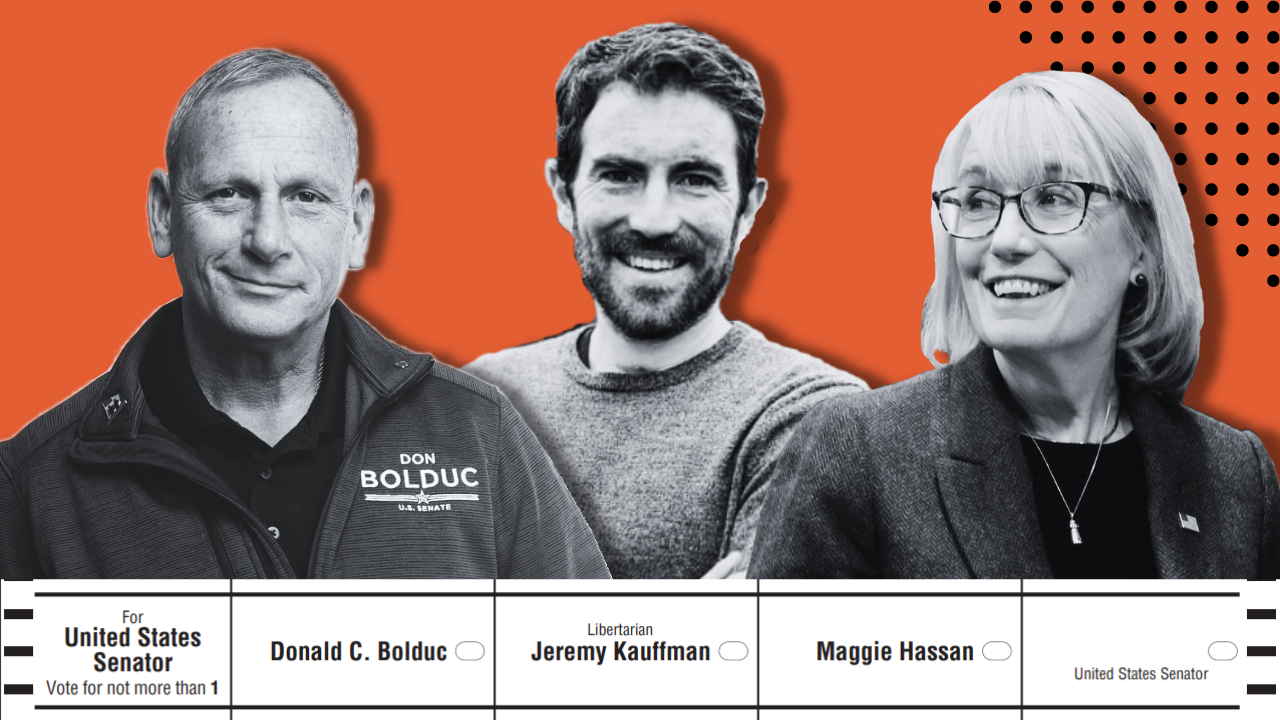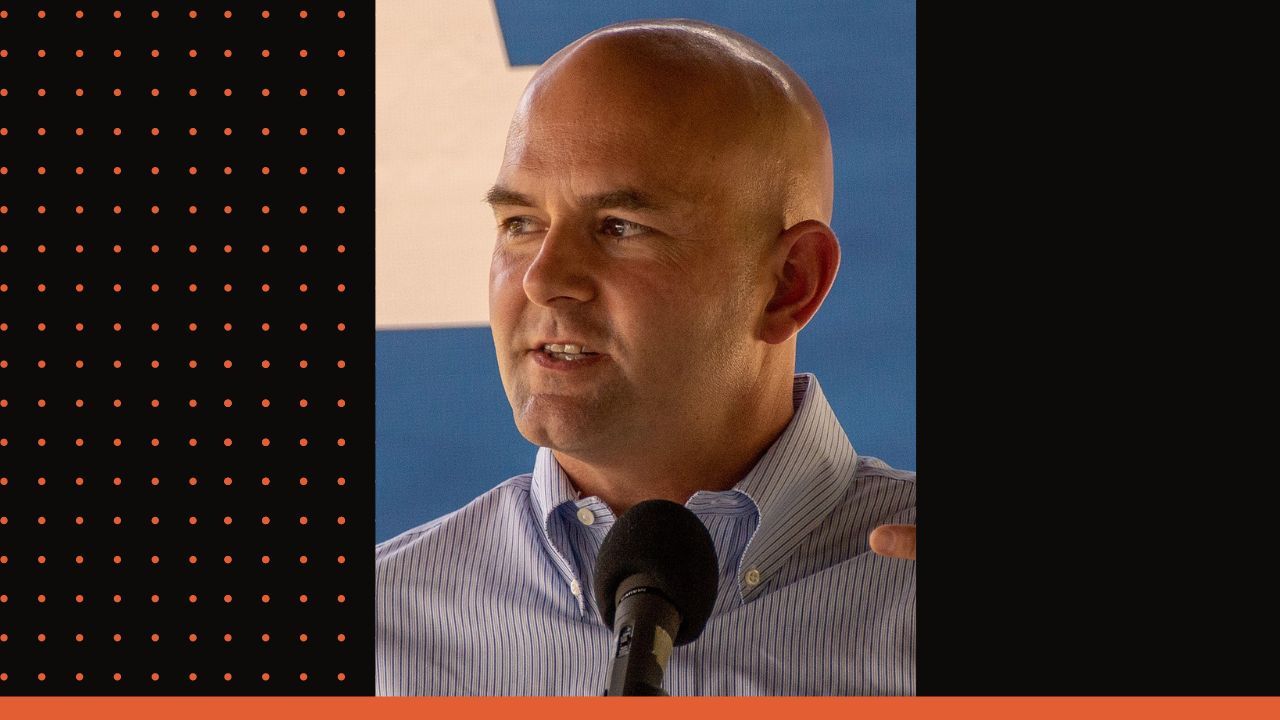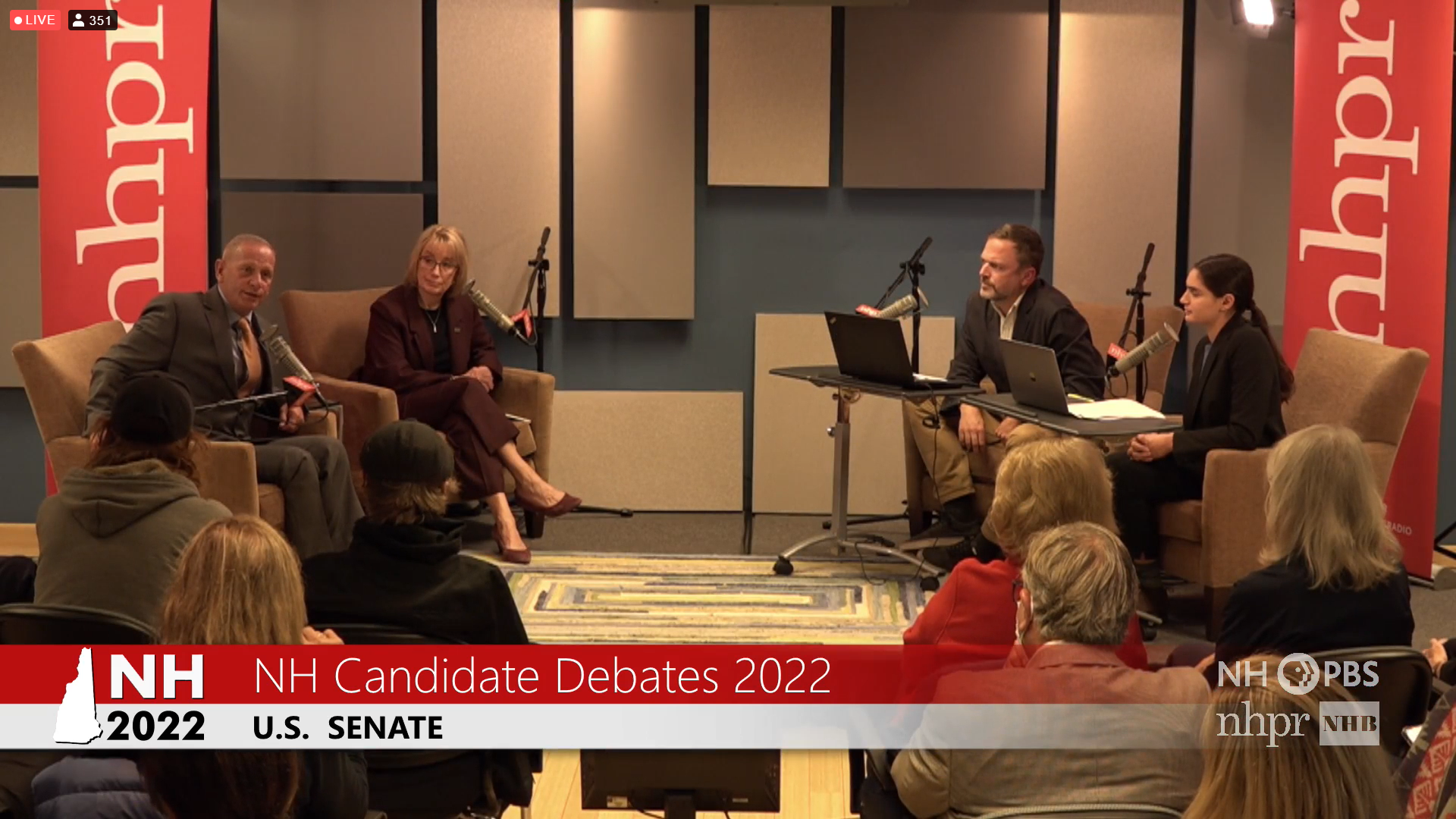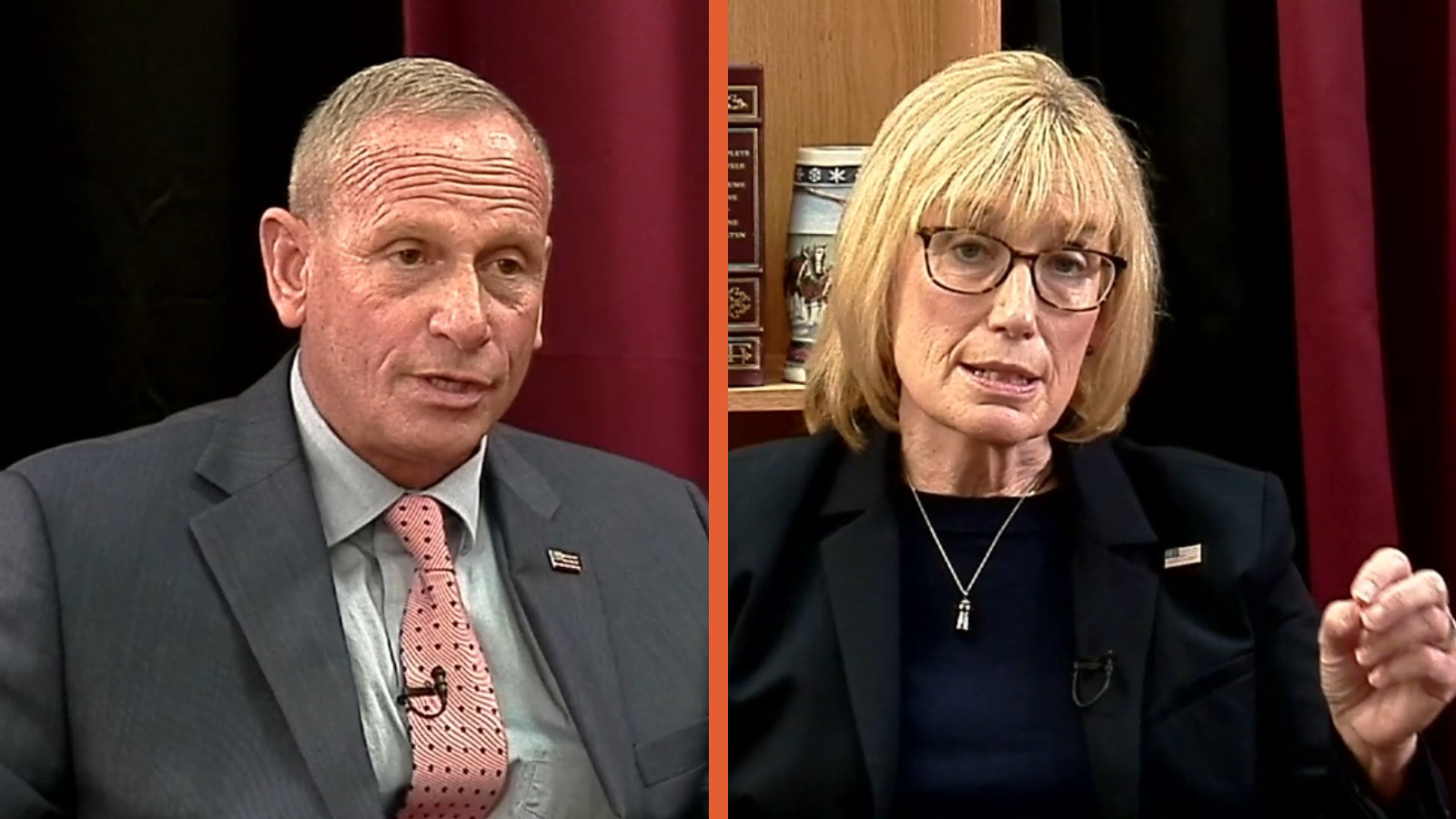In Senate debate, both Hassan and Bolduc put spotlight on Hassan's record

Democratic U.S. Sen. Maggie Hassan faced off against her Republican opponent, Brig. Gen. Don Bolduc, in a debate co-hosted by New Hampshire Public Radio and the Bulletin on Thursday. And between the candidates, one focus reigned above all: Hassan’s record in her first six-year term in office.
Hassan sought to highlight that record, pointing to sweeping bills she had supported and her ranking as a bipartisan senator. Bolduc, meanwhile, spent much of the debate trying to use her record against her.
Neither candidate appeared especially interested in talking about future priorities. Bolduc was often reticent to discuss specific actions he would take, and Hassan frequently pivoted back to the bills she had already worked on.
But the debate offered a clarifying glimpse at the vast divisions between the two on policy – and on personality.
Here are some takeaways.
1. The state of voting
During the debate, Bolduc sought to establish his acceptance of the results of the 2020 presidential election. Previously, he has called President Joe Biden’s victory into question; on Thursday, he reiterated his change in position and said he accepted the results.
“I’m supposed to be accountable, responsible, transparent, trustworthy, tell the truth, admit when I’m wrong,” he said. “And I’ve admitted that I got it wrong on the 2020 election.”
But Bolduc appeared more receptive of other false theories around elections. One topic: school buses filled with of voters.
“We need to make sure that school buses loaded with people at the polls don’t come in and vote,” he said.
The remark was a throwback to a debunked accusation by Gov. Chris Sununu as a candidate in 2016 that Democrats were “busing (voters) in all over the place,” including from Massachusetts, an assertion later echoed by President Donald Trump. That claim was dismissed as false by then-Secretary of State Bill Gardner; Sununu has since retracted it.
Pressed on the evidence Thursday, Bolduc cited conversations with voters. “I am saying that this is what Granite Staters are telling me, and I think it’s valid,” he said, adding that he thought they should be investigated.
Bolduc listed a string of other concerns common among New Hampshire conservatives, including the state’s same-day voter registration, the ability for college students domiciled in the state to vote, and the use of voting machines and mail-in absentee ballots. But despite those qualms, he argued that Congress should not intervene in state election laws.
“The federal government needs to stay out of elections at the state level, and these are all laws that have to be relooked,” he said.
Hassan, meanwhile, defended her support for Senate Bill 1, the sweeping legislation that would have created a number of federal election requirements, including automatic voter registration, early voting, the elimination of some voter ID requirements, campaign finance reform, and requirements for independent redistricting commissions.
Hassan said the reforms would lead to fairness and better access to the election process for residents across the country. And she said that independent redistricting commissions should be embraced by both parties.
“Here’s the reason why having free and fair elections matters: It is because it is the way people in New Hampshire hold us accountable,” Hassan said.
2. Abortion laws and the role of Congress
Bolduc also strove to make another position of his clear: He would not support a federal abortion ban if elected. Instead, the candidate said, he supports the Supreme Court’s decision this year in Dobbs v. Jackson Women’s Health Organization that erased the federal right to abortion established under Roe v. Wade and sent the matter back to state legislatures.
Bolduc took issue with a barrage of advertising on behalf of Hassan during the campaign about his pro-life positions, arguing that they do not mean he would support a ban.
“I do not support a federal ban either for or against abortion at the federal level. It is now a state issue, which she does not understand,” Bolduc said.

Hassan, for her part, said Congress should not have a role in preventing abortions. But she supports a federal law to establish abortion rights in all states. Hassan co-sponsored the Women’s Health Protection Act in the Senate in 2021, which would codify the right to abortion in federal law.
“It would be my preference that neither legislators in the United States Senate nor in state legislatures substitute their judgment in complex difficult decisions for women and their doctors,” she said Thursday. “I also think it’s really important that we allow doctors to do their jobs without fear of criminal prosecution.”
3. Two visions for reducing rising costs
Hassan stressed that inflation is a “global phenomenon.” “So it’s absolutely essential we do what we can right now to lower people’s costs while also dealing with the long-term drivers of inflation,” she said.
Approaches to do that, Hassan said, include a law she co-sponsored to allow Medicare to negotiate prescription drug prices, a measure that takes effect in 2025, and pressing the White House to release home heating fuel from federal reserves to reduce heating costs. Hassan also referred to her push for the suspension of the federal gas tax, which she said was blocked on the Senate floor by Senate Minority Leader Mitch McConnell.

Bolduc sees the cost issue differently. Fixing inflation means spending less, he argued.
He said he would support federal legislation “to stop any additional spending until we got inflation under control.” And he said he would support a bill to limit quantitative easing – the process by which the Federal Reserve purchases debt to stimulate the economy – which he said has added to the national debt.
And Bolduc said that he would support more domestic oil drilling to increase supply and reduce the price spikes for gas and heating oil.
“(The Keystone) XL pipeline, more drilling, more permits, more leases,” he said, naming examples. “This doesn’t empower the petroleum industry. It’s dropped prices for you. It makes life affordable for you.”
4. Action on climate change
Asked about U.S. policy to address climate change, Hassan took the opportunity to promote the Inflation Reduction Act, the 2022 omnibus legislation that devotes $369 billion toward clean energy tax credits for consumer purchases of solar panels and electric vehicles, investments in green energy technology, upgrades to public electric vehicles like school buses and mail vans, incentives for sustainable farming practices, and others.
“Climate change is a huge issue,” she said. “I hear about it from small businesses on the seacoasts seeing increased sea-level rise and facing flooding. I see it and hear about it from the travel and tourism industry here in New Hampshire and from homeowners.”
But pressed during the debate, Hassan did not identify clear next steps the U.S. should take to reduce its emissions beyond this year’s legislation.
Bolduc disagrees with the approach. “I think the federal government involved in this business is a complete waste of money and a waste of time,” he said. “I think the state governments should do it. I think our state legislatures and our governors will take care of our environment really well.”

Bolduc said he would support “anything to help the environment,” but said he disagrees with certain spending toward a transition to clean energy. “They’re taking away fossil fuels which they need in order to be able to make renewable energy,” he said, referring to Democrats. “They’re costing you way more money.”
Bolduc argued that the key to addressing climate change lay not with further U.S. domestic policy, but with holding other major polluting nations to U.S. standards. “How about China, Russia, North Korea, Iran: The biggest polluters in the world?” he said. “She’s got nothing to say about that.”
5. A difference in campaign styles
On Thursday, each candidate was pressed about their campaigning style.
Bolduc has changed his positions frequently. He’s wavered on his acceptance of the 2020 election results, now accepting them, has spoken differently about his opposition to abortion rights to different audiences, and says he does not support winding down Social Security and other entitlements despite earlier stances in favor.
Bolduc said his willingness to adapt his positions is a highlight, not a flaw.
“It’s not changing for audiences,” he said. “It’s changing because that’s what I’m supposed to be: accountable. … I account. She does not.”

Hassan, meanwhile, was asked about her tendency to hold closed press events, and stray away from town halls with voters and open press conferences. She argued she had reached her constituents in other venues.
“I’m out and about talking to Granite Staters all the time,” she said. “I have lots of events at businesses, where I sit down with employees. I listen to their concerns. I shop at Market Basket. I go to Dunkin’ Donuts. I hear a lot from Granite Staters, both positive and negative.”
This story was produced by the editorially independent New Hampshire Bulletin, which is part of States Newsroom. Contact Editor Dana Wormald for questions: info@newhampshirebulletin.com.
